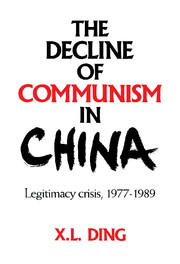Summary
The collapse of communism in Eastern Europe and the Soviet Union has raised a most serious challenge to the recent mainstream theories of revolution in the social sciences, which neither prepared researchers to catch key signs presaging the revolutions of 1989 nor provided a satisfactory explanation afterward (Brumberg 1990: 3–16; EEPS 1990; Chirot 1991). In the light of the historic events in the communist world in the late 1980s and early 1990s, theoretical revisions and conceptual innovations in the social sciences are necessary.
In a review of existing theories of transition from communism, Thomas F. Remington (1990: 177, 184) notes that these theories are either regime-centered or society-centered and that “each adopts a partial view of the relationship” between regime and society, in which concentration is placed on “the political or the social domain to the neglect of the other.” “A theory of transition from communism,” Remington suggests, “should instead be based upon an understanding of how the regime and the society influence and penetrate each other, and how that relationship changes during the transition itself.”
Having correctly pointed out the inadequacy of these theories, Remington nevertheless fails to see that the root of that inadequacy is in the dichotomous conceptualization of civil society versus the state, which underlies both the regime-centered and society-centered theories.
- Type
- Chapter
- Information
- The Decline of Communism in ChinaLegitimacy Crisis, 1977–1989, pp. 195 - 204Publisher: Cambridge University PressPrint publication year: 1994



